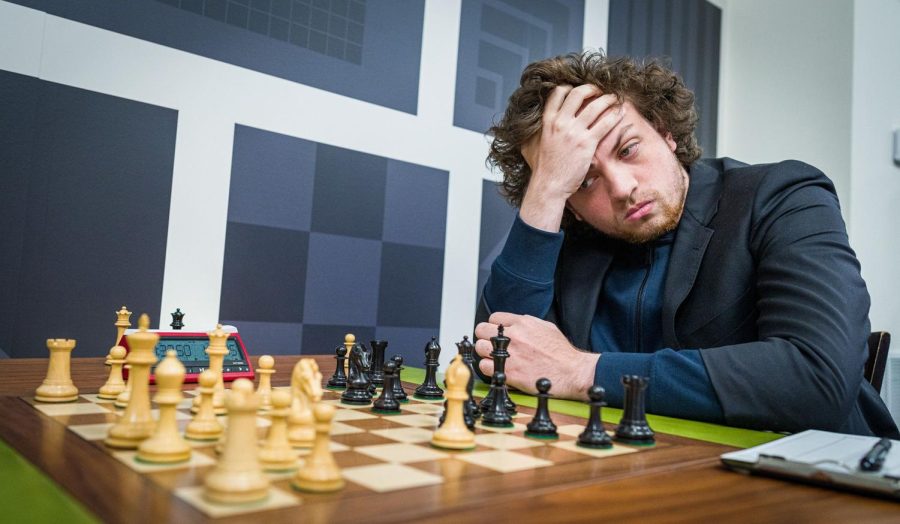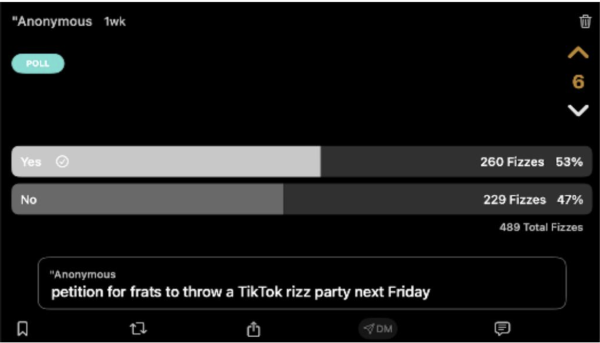Hans Niemann can’t be trusted
Behind the mysteriously good looks of the professional chess player lies something devious
Hans Niemann is good looking, but mystery lurks beyond his handsome face, writes Sophie Guymon.
October 20, 2022
If you’ve been keeping up with the world of chess, you’re probably aware of the current cheating controversy between World Champion Magnus Carlsen and Grandmaster (GM) Hans Niemann. While there is no definitive proof that Niemann cheated in his game against Carlsen or in other over the board (otb) chess games, it is proven that he has cheated in upwards of 100 online games between the ages of 12-17, some in tournaments with prize money at stake. This evidence contradicts Niemann’s previous claims that he only cheated in one Titled Tuesday game when he was 12, and in “random games” when he was 16 with no prize money at stake.
Carlsen has also received his fair share of criticism surrounding the situation — for not making a concrete statement on the matter until weeks after the fact, for not bringing evidence to the table and even allegedly colluding with chess.com to unjustly destroy the career of someone 12 years his junior.
While many fans are firmly pro-Carlsen or pro-Niemann in this debacle, others are undecided, believing that both men have conducted themselves poorly, or that Niemann’s online cheating makes him untrustworthy but does not merit a ban from otb chess or sanctions on his career. If you’re attempting to pick a side, you might think to consult the chess.com report, other high-level chess players and experts or even — everyone’s favorite — random strangers on the internet.
However, these perspectives have already been exhausted, and who cares what they have to say anyway? Instead you should listen to me — a 20 year-old college student who has never played a game of chess but went to school and church with Niemann for approximately one year. Having (somewhat, vaguely) known Niemann long before he was climbing the ranks in chess, I have a new and unique perspective. In fact, I might just be the ultimate authority on this matter.
Place yourself in my shoes for a bit. It’s 2013: and you’re finishing out your sixth and final year of elementary school. Middle school is just around the corner, and you’re bored. You know that better things are on the horizon and that in a matter of months you’ll have a chance to reinvent yourself as a cooler, more interesting person.
Enter: Hans Niemann, the mysterious new boy in the grade below you, who just moved in from the Netherlands. He walks around the cafeteria with a sense of purpose and an aura of self-assuredness and frequently misses Sunday church service to compete in chess tournaments.
Having spent the majority of your life in a town with a population of 17,000 people, going to school and church with the same set of people and rarely going on vacations more interesting than visiting your extended family in Utah, you’ve never met someone so worldly.
So to the girls who might be crushing on Hans and romanticizing his bad boy image, here’s a piece of advice: don’t. You can’t change him, and you don’t want your name attached to someone with so much negative press. Dark, brooding and Heathcliff-esque anti-heroes like Hans might belong in the pages of romance novels, but that doesn’t mean they deserve space in the pages of your life.
However, you’re cripplingly shy and rarely venture outside your close circle of five friends. You’re also slightly embarrassed by the fact that Hans is a full grade younger than you — the scandal! — and thus, you harbor your crush in secret. When you pass by him, you do that dumb elementary school thing where you pretend to be mean and uncaring, thinking he’ll somehow be impressed.
Months go by, and you finally make it to middle school, where you find a new, unattainable boy to crush on and forget all about Hans. Your opinion has also been soured by Disney’s “Frozen”, where the villain is — you guessed it — a bad boy named Hans. By the time you’ve finished sixth grade, the Niemann family has packed up their bags and moved out east to pursue opportunities in the world of chess.
You grow older and wiser, finally dipping your toes in the dating pool after starting your freshman year of college a safe 2,700 miles away from your parents. You major in psychology and begin to construct explanations for all of your failed love connections and minor in Women’s, Gender and Sexuality Studies, in which you discover your worth as a woman. Armed with this academic knowledge, as well as years of teasing and admonishments from your friends, it occurs to you that maybe your taste in men isn’t the best.
So, you resolve to not waste your time pursuing men who are emotionally unavailable and focus your energy towards your social, academic and family life, establishing yourself as the opinion editor of your college newspaper. Now fast forward to just a couple of weeks ago. You’re texting back and forth with your co-editor, Maryam Khanum, deliberating which article ideas you should send to your staff writers this week. She mentions something about drama in the chess world, and you agree to add it to the list but don’t bother looking into it.
So imagine your surprise when you begin reading an article submission from Life Editor Adam Coil and see the name Hans Niemann.
“Wait a minute,” you think. “I know that kid.”
Wanting to be sure, you consult your trusty friend Google Images, and find that the man staring back at you is exactly who you think he is. To be even more thorough, you check the “Early Life and Education” section of his Wikipedia page, and find confirmation that he did, in fact, attend your elementary school.
For the first time since “The Queen’s Gambit” was released, your interest in chess is piqued. You peruse subreddits, watch post-match interviews on YouTube, scour Twitter threads and generally gather all the information you can on Niemann and his alleged cheating without actually understanding the game of chess.
Your conclusion is this: none of the men you’ve ever liked have done anything but disappoint you, so why should Hans be any different? You pegged him as a mysterious, aloof bad boy way back in elementary school, and now the chess world has only confirmed your 11 year-old self’s impressions, branding him their poster child of cheating and bad behavior.
Furthermore, if Hans has cheated in chess, who’s to say that cheating hasn’t carried over to *ahem* other aspects of his life. As the saying goes, “once a cheater, always a cheater.”
So to the girls who might be crushing on Hans and romanticizing his bad boy image, here’s a piece of advice: don’t. You can’t change him, and you don’t want your name attached to someone with so much negative press. Dark, brooding and Heathcliff-esque anti-heroes like Hans might belong in the pages of romance novels, but that doesn’t mean they deserve space in the pages of your life.























